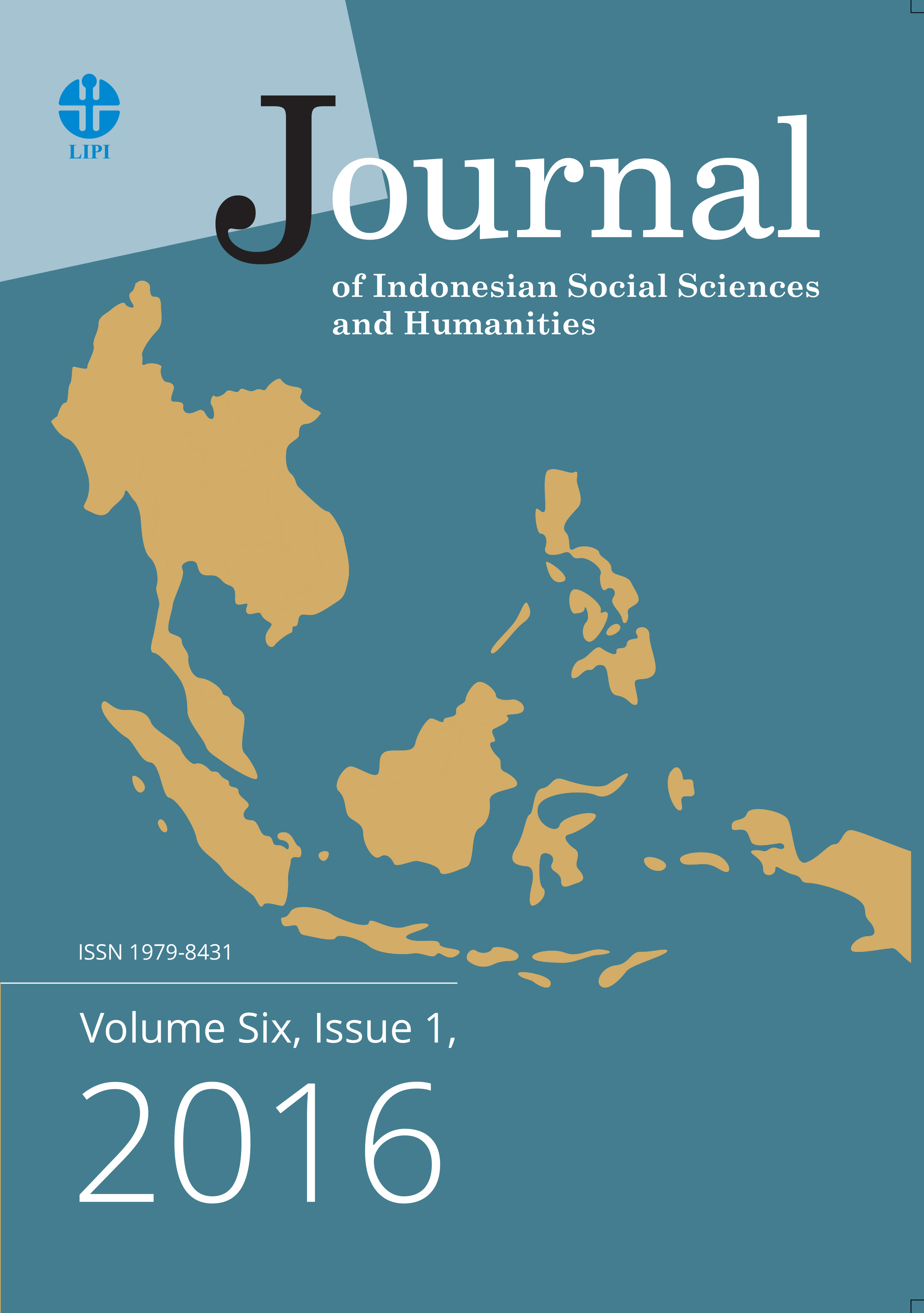Beyond Ideology: China-Indonesia Engagement and the Making of the Guided Democracy, 1955-1959
Keywords:
Indonesia, China, overseas Chinese, Guided Democracy, Cold WarAbstract
China’s engagement with Indonesia from 1955 to 1959 was neither ideologically oriented nor realpolitik, but somewhere in between. It happened not only because of the changing domestic political situations or completely subject to the shifting international environment, but was also closely associated with intrinsic social and historical issues that transcended geographical, ideological and ethnic boundaries within and across the two nation-states. To some extent, this effective engagement was not a result of Indonesia’s leaning towards the left, but a reason for it—not in the sense of direct political intervention, but through the pursuit of common identity and interest, which significantly shaped the making of Indonesia’s Guided Democracy.
References
---------, “Akrobatik Peking,” [Beijing Acrobat] Harian Rakjat [People’s Daily], 24 August 1956.
---------, Republic of Indonesia, Indonesia 1999: An Official Handbook. Jakarta: Department of Information, Republic of Indonesia, 1999.
---------,”Akrobatik Peking--Pemain-2 yang Terkenal” [Famours Beijing Acrobats], Harian Rakjat [People’s Daily], 29 August 1956.
---------,”Pertunjukan delegasi kebudayaan Republik Rakyat Tiongkok, “[The Performance of the Cultural Delegation of the People’s Republic of China] pamphlet printed for the performance of the PRC Cultural Delegation, 1955.
---------,”The 1st Five-Year Plan (1953-1957),” in GOV.cn, <http://www.gov.cn/english/2006-.htm>(accessed 13 Dec 2015).
Abdulgani, Roeslan, Laporan Menteri Luar Negeri [The Report of the Ministry of the Foreign Affairs], 1956.
Anderson, Benedict. Imagined Communities: Reflections on the Origin and Spread of Nationalism, London: Verso, 1991
Dijk, C. van. The Indonesian Communist Party (PKI) and Its Relations with the Soviet Union and the People’s Republic of China. The Hague: International Documentation and Information Centre, 1972.
Ding, Kuanghua. Zhong Gong Zai Dongnan Ya [CPC in Southeast Asia]. Taibei: [s.n.], 1959.
Feith, Herbert. The Decline of Constitutional Democracy in Indonesia, Ithaca N.Y.: Cornell University Press, 1962.
Flood, Finbarr Barry. Objects of Translation: Material Culture and Medieval “Hindu-Muslim” Encounter. Princeton: Princeton University Press, 2009.
Hua Qiao Zhi Bianzhuan Zhuan Weiyuanhui [The Writing Committee of the History of Overseas Chinese] Hua Qiao Zhi—Yinni [History of Overseas Chinese--Indonesia]. Taibei: Hua Qiao Zhi Bian Zhuan Wei Yuan Hui, 1961.
Kasdi, Aminuddin.. Kaum Merah Menjarah: Aksi Sepihak PKI/BTI di Jawa Timur, 1960-1965. Yogyakarta: Jendela, 2001.
Lane, Max. Unfinished Nation: Indonesia before and after Suharto. London: Verso, 2008.
Leifer, Michael. Indonesia’s Foreign Policy. London: Published for the Royal Institute of International Affairs by Allen & Unwin, 1983.
Lenman, Bruce, and Trevor Anderson. Chambers Dictionary of World History. Edinburgh: Chambers, 2000.
Lev, Daniel S. “The Political Role of The Army in Indonesia”, In Man, State, and Society in Contemporary Southeast Asia, edited by R.O. Tilman. New York: Praeger, 1969
Li, Yiping & Zeng, Yuleng, “1958-1965 Nian Zhongguo Dui Yinni De Yuanzhu (A study on Chinese aid toward Indonesia during 1958-1965)”, Southeast Asian Affairs, No. 3 2012.
Liu, Hong, Zhongguo Dui Yindunixiya De Gonggong Waijiao, 1955-1965 [China’s ‘Public Diplomacy’ towards Indonesia, 1955-1965]”, in China.org.cn, 29 December 2011, <http://www.china.com.cn/international/txt/2011-12/29/content_24282873_3.htm> (accessed 14 Dec 2015)
Liu, Hong. China and the Shaping of Indonesia, 1949-1965. Singapore: NUS Press in association with Kyoto University Press Japan, 2011.
Mackie, J. A. C. The Chinese in Indonesia: Five Essays. Honolulu: University Press of Hawaii in association with Australian Institute of International Affairs, 1976.
McVey, Ruth Thomas “Indonesian Communism and China” in Tang Tsou ed. China in Crisis .Chicago: University of Chicago Press, 1968.
Mozingo, David P. Sino-Indonesian Relations: An Overview, 1955-1965. Santa Monica, Calif: Rand Corp, 1965.
Ricci, Ronit. Islam Translated: Literature, Conversion, and the Arabic Cosmopolis of South and Southeast Asia. Chicago: University of Chicago Press, 2011.
Ricklefs, M.C. A History of Modern Indonesia, Macmillan Southeast Asian reprint, 1982
Simon, Sheldon W. The Broken Triangle; Peking, Djakarta, and the PKI. Baltimore: Johns Hopkins Press, 1969.
Song, Qingling. Persahabatan jang semakin Akrab antara Tiongkok dan Indonesia [The increasingly Close Relationship between China and Indonesia]. Peking: Pustaka Bahasa Asing, 1957.
Sukma, Rizal. Indonesia and China: the Politics of a Troubled Relationship. London: Routledge, 1999.
Willmott, Donald Earl. The National Status of the Chinese in Indonesia. Ithaca, N.Y.: Modern Indonesia Project, Southeast Asia Program, Dept. of Far Eastern Studies, Cornell University, 1956.
Xu, Ming, “Wang Renshu Dashi Bei Toupaizhao Fengbo” [Dispute about Ambassador Wang Renshu Being Taken Pictures Secretly], Memories and Archives, (2011): p.12
Zheng, Xuejia. Whither Indonesia? : PKI and CCP. Taipei, Taiwan, China: Asian Peoples’ AntiCommunist League, Republic of China, 1960.
Zhu, Xie. Zhongguo he Yindunixiya Renmin De Youyi Guanxi he Wenhua Jiaoliu [The Friendship and Cultural Exchange between People of China and Indonesia]. Beijing: Zhongguo Qingnian Chubanshe, 1956.
Downloads
Published
Issue
Section
License
Copyright (c) 2016 Kankan Xie

This work is licensed under a Creative Commons Attribution-ShareAlike 4.0 International License.
Authors who publish with this journal agree to the following terms:
1. Authors retain copyright and grant the journal right of first publication with the work simultaneously licensed under an Attribution-ShareAlike 4.0 International (CC BY-SA 4.0) license. This license allows others to remix, adapt, and build upon the work, as long as they credit the author and license their new creations under the same terms.
2. Authors may enter into separate, additional contractual arrangements for the non-exclusive distribution of the journal’s published version of the work (e.g., posting it to an institutional repository or including it in a book), provided there is an acknowledgment of its initial publication in this journal.
3. Authors are permitted and encouraged to post their work online (e.g., in institutional repositories or on their personal website) prior to and during the submission process, as this can lead to productive exchanges and increase citations of the published work (See The Effect of Open Access ).


















